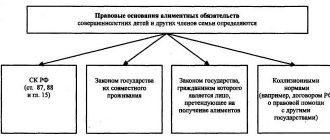Failure to pay alimony, if there is a writ of execution or other exacting document, is an administrative or criminal offense. We are talking about a criminal violation even when there has been no payment for more than six months, a large amount has accumulated and the bailiffs cannot collect anything.
For reference: malicious evasion of alimony payments is punishable under Article 157 of the Criminal Code of the Russian Federation. This article even provides for imprisonment for up to 5 years.
Is it worth contacting the prosecutor's office if the father does not pay child support? Such cases are not within the jurisdiction of prosecutors; you need to file an application with a bailiff or in court.
But, you can contact the prosecutor's office with a statement if the bailiffs are inactive in the case of alimony collection.
General rules for incentive payments
Measures that may be taken against the defendant: fines and penalties, seizure of property and a ban on leaving the country, deprivation of parental rights and control of a vehicle, administrative arrest and imprisonment.
Attention!
Arrest and imprisonment are measures that can only be taken for malicious evasion of parental obligations.
Any incentive measure is applied by court decision. A bailiff can initiate the proceedings. The payer has the right to speed up the process by filing an application to take measures against the defaulter. In fact, taking measures against an unscrupulous payer is the task of the bailiff. But due to the workload and low level of responsibility of the performers, the necessary actions have to be stimulated by filing complaints and statements.
The application of payment incentive methods to the alimony debtor can be initiated by the recipient, namely by writing a statement of non-payment. This is stated in Article 157 of the Criminal Code of the Russian Federation.
Writing a letter to a defaulter
Evasion of payment of alimony and arrears is a criminal offense. For this you can get up to 1 year of correctional labor. It is advisable to write a letter to the defaulter, since this is sometimes the way to obtain payments.
The document must indicate the consequences of non-payment, as well as identify the articles of the law. The letter must be sent with notification, which allows the conflict to be resolved peacefully. You can also identify other restrictions that are possible in case of non-payment.
Non-payment of alimony and the prosecutor's office
Frankly speaking, the issue of non-payment of alimony is not a subject for consideration by the prosecutor's office.
Any problematic issues that arise in connection with the enforcement of a court decision on the collection of alimony payments, bringing to administrative and criminal liability for failure to fulfill alimony obligations must be resolved exclusively by bailiffs - that is why the Bailiff Service functions in the state apparatus.
It is useless to write a complaint to the prosecutor's office about an ex-husband who does not fulfill his alimony obligations.
We will discuss below in what cases it makes sense to file a complaint with the prosecutor’s office. If you are interested in the issue of holding a defaulter accountable for non-payment of alimony, read on.
Is it possible to contact the prosecutor's office for alimony?
The prosecutor's office does not have the right to supervise the defaulter, but monitoring the work of the executive service is one of its functions.
You should not remain idle if, due to the fault of the bailiff, the payment of alimony is delayed. Having received all the evidence, you should write a statement (complaint) to the prosecutor’s office and the process will go much faster.
You can, of course, speed it up on your own, for example, if the debtor is officially employed, take the writ of execution to the accounting department of his enterprise and submit it yourself.
The availability of real estate and other assets can also be found out through certain services. But you shouldn’t get carried away and do the bailiff’s job instead of him.
If there is no response to complaints, the head of the executive service and higher authorities should submit an application to the prosecutor's office. A correctly executed document will be quickly reviewed and the process will proceed at an accelerated pace.
Terms of consideration
The time allotted for consideration of appeals received by the prosecutor's office is limited by the provisions of Federal Law No. 59 and internal departmental orders. Employees of the prosecutor's office are given 3 days to register a complaint received, and a maximum of 10 days to review it. a period of 1 month to verify the described violation and take measures to eliminate it .
Attention! Due to recent changes in legislation, the legal information in this article may be out of date!
Our lawyer can advise you free of charge - write a question below.
Grounds for contacting the prosecutor's office regarding alimony
As follows from the above, you can write a statement complaining about the bailiff’s negligent attitude towards his work.
This should not be done out of the blue, but if:
- the bailiff does not pay any attention to signals of non-payment, or even deliberately opposes receiving money for a child or other socially vulnerable person;
- the debt grows, and the employee, who is obliged to control the timely receipt of money, is inactive - does not hold the defaulter accountable, does not search for his property, does not calculate the alimony arrears;
- there are suspicions of a criminal conspiracy between the payer and an employee of the executive service - then you can submit an application to initiate a criminal case and check for a corruption component;
- proceedings on the collection of alimony have been suspended or terminated, and the reasons have not been clarified or are far-fetched.
As already written above, you can start by filing a complaint with the higher management of the executive service.
You can submit appropriate applications to the immediate supervisor of the bailiff, and if there are no results, to the organization at the city and regional level.
All complaints must be registered and responses saved. Such documents will be a good addition when submitting an application to the prosecutor's office.
Important! Usually the prosecutor's office checks all applications, but in some cases the application may be forwarded to the head of the “problem” bailiff under jurisdiction. To prevent this from happening, you must first contact the management of the FSSP department.
In order to know for sure whether the bailiff is engaged in enforcement proceedings in the case of alimony for a specific person, you should review the working documents on it.
To do this, the interested party writes a statement about familiarization with the materials of the enforcement proceedings. If the applicant intends to copy materials, he must indicate this in the application.
Arriving at the appointment, he can view, copy using his own copier or photograph the necessary papers. They will be needed as evidence of the negligence of the responsible employee.
Important! The alimony payer can also file a complaint against the bailiff if he discovers that the employee of the enforcement service is exceeding his authority in relation to him.
Basic information
The FSSP is engaged in the collection of alimony payments. If the recipient of the funds went to the prosecutor's office with a complaint against the alimony provider, this is unlikely to lead to any result, however, a statement about the inaction of the FSSP representative and his failure to fulfill his work duties can solve the problem.
You can go to the prosecutor's office with a complaint if the bailiff does not search for property, does not check whether the alimony worker has bank deposits, etc.
Before going to the prosecutor's office, it is recommended to use other methods of influencing the bailiff.
For example, you can send a formal complaint to the head of the service, which will be registered.
The number of the incoming document will be issued for it. Over the next 30 days, the applicant must expect a response to his application.
Procedure for contacting the prosecutor's office
First of all, it is recommended to send a complaint to the higher management of the enforcement service - for example, the head of the bailiff, whose work the applicant is dissatisfied with. If there are no satisfactory results, you will need to contact the regional or city organization.
Complaints must be recorded and all responses received must be retained. When sending an application to the procurator, this package of documents will come in handy.
The application will need to include the following information.
- Name of the prosecutor's office, address of the institution.
- Information about the applicant: full name, residential address, contact information (current telephone number, email address).
- Description of the current life circumstances: the court made a decision, sent a writ of execution to the FSSP, initiated enforcement proceedings.
- Listing of the actions of the applicant, actions or inaction of the bailiff (lack of seizure of bank accounts, search for the alimony debtor, restrictions on the right to travel outside the borders of the Russian Federation).
- The amount of alimony debt at the time of filing the application.
- The prosecutor is asked to check the fulfillment of duties by the bailiff, to bring representatives of the FSSP to justice due to improper performance of their duties, and also to bring the debtor to one or another type of liability.
- Signature, date of application.
The prosecutor will not examine anonymous statements. You will need to write down accurate information about yourself in the document and put your signature.
When writing the text of the application, the following rules should be taken into account:
- if the applicant is well versed in the legislation of the Russian Federation, then he has the right to write down the articles on which he relies when presenting the current life circumstances (if there is no knowledge in this area, then it is better not to indicate the articles);
- thoughts will need to be presented in a concise, specific, clear form, in a business style, without florid additions and turns.
The documents attached to the application include the following:
- passport;
- court order on alimony obligations;
- resolution of the bailiff establishing the initiation of enforcement proceedings;
- copies of complaints, statements, written responses and decisions from the bailiff.
This list of documents is not exhaustive - depending on the situation, other certificates may be required.
The application and the documents attached to it can be submitted during a personal visit to the prosecutor's office, as well as by registered letter or the official website of the institution. If you choose the latter option, you will need to scan all relevant documents and then upload them to the service as an archive.
How to direct
There are three different ways to submit this type of application:
- In electronic form on the website of the prosecutor's office. Please note that all documents will need to be scanned and attached to the letter, which is not very convenient.
- By registered mail. Convenient, simple and fast, but there is a small chance that the letter will get lost somewhere and will not reach the addressee. Such situations do not arise too often, but they cannot be ignored.
- Apply in person to the prosecutor's office. This is the most optimal and reliable option, but not the most convenient, since you will need to first check the office hours, and then set aside time and go to the department.
Application to the prosecutor's office
The application is submitted to the prosecutor of the city or district in whose territory the applicant’s rights are violated. If the prosecutor's office decides that the application should be considered by officials of other government agencies, it may redirect the application, of which the applicant will be notified. The application can also be sent by mail - registered mail with acknowledgment of receipt.
Residents of the capital can send an electronic complaint to the prosecutor's office. To do this, you need to go to the official website of the Moscow Prosecutor's Office, open the Internet reception section (https://www.mosproc.ru/ipriem/iemail.php) and fill out the application fields.
How to write an application correctly?
There is no clearly defined form to fill out for this application. That is, you can compose it by hand if you wish. However, in addition to being legible, what is written must meet all standard requirements. This is due to the fact that the application is primarily an official document that will be considered by the prosecutor.
A correctly drawn up application to the prosecutor's office should consist of:
- Introductory part , which provides information about both the recipient of the application and its sender. Such an application will not be accepted anonymously, much less considered. First of all, you will need to indicate the name of the prosecutor's office or indicate the surname and initials of the prosecutor to whom the application will be submitted. It is recommended to clarify this information by calling the prosecutor's office of your department at the place of application. After indicating who exactly the document is being sent to, your information as an applicant will be required. They consist of full name, address (registration or residence) and contact phone number. If you wish, you can provide an email address;
- Information part. This part is the “body” of the entire document. In it you will need to outline the situation. For the greatest ease of compilation, you can start with exactly when the trial took place, what decision was made, and then - when exactly the writ of execution was handed over to the bailiffs. Remember that you must indicate all dates as clearly as possible, indicate document numbers, and also try to adhere to the business tone of the letter. Only facts, no emotions, much less curses or aggression. After indicating the fact of transfer of the writ of execution to the bailiffs, you can already indicate in what time frame the payments were made, if any. You can also tell us about how your dialogue with the bailiff went. The entire description of what happened should be as brief as possible and give an understanding of the overall picture of what happened;
- The operative part. This paragraph indicates your requirements for these violations by bailiffs. You can ask the prosecutor's office to conduct an audit of the activities of this particular employee, and also bring him to justice. In addition, it would not be amiss to indicate a request to take action regarding the situation. All your demands must be justified and legal;
- List of attached documents. They are a copy of your passport, a copy of the writ of execution, as well as a copy of the complaint against the bailiff (to the SSP or senior bailiff) and their official response (if any). Of course, this is the most recommended option - to have the BSC response in hand.
This application is confirmed with a date and your signature. It is recommended to make a copy of the application, as is customary to do with almost any application of this kind. After which the appeal can already be submitted to the prosecutor's office
It is highly recommended to submit the completed application in person or by registered mail with acknowledgment of receipt. The period for consideration of an application to the prosecutor's office is no more than thirty days. Once a decision is made on this document, you must be notified, usually in writing. However, you can always call the prosecutor's office to clarify information.
Composition of the document
The application consists of three main parts. All of them must be included in the document. So:
- The application header is placed at the top. It must indicate the details of the prosecutor’s office employee to whom the citizen is applying. This should also contain information about the applicant. It is necessary to indicate the full name, residence/registration address, telephone number through which an employee of the authority can contact the applicant.
- The main part of the document should describe the current situation in detail. Information should be posted in chronological order. In this case, it is necessary to indicate what actions were taken by the applicant, what the bailiff did (if he was inactive, this must be emphasized), how much money the payer owes at the time of the application.
- The last part of the application indicates the applicant's requirements. They should be written as clearly and understandably as possible. It depends on whether the prosecutor understands the essence of the citizen’s demands or not.
Peculiarities! If a citizen, in the operative part of the application, can point out the regulations that were violated by the bailiff, the process of considering the application can be accelerated. However, if in doubt, it is better not to enter this information.
The document is signed by the applicant and the date of its submission to the appropriate authority. After receiving the application, its consideration will begin .
Sample application to the prosecutor's office for non-payment of alimony
Additional Documentation
Along with the application, the citizen must provide additional documents to the prosecutor's office.
First of all, you need to have your passport with you. In addition, you will need the following papers:
- the decision of the judge on the basis of which the funds are collected;
- the bailiff's resolution, which indicates that enforcement proceedings on this decision were opened;
- copies of each complaint filed with the bailiff service;
- copies of responses received to these complaints.
If the applicant also has additional documents on hand that confirm the information described in the application, they should be used.
The more documentary evidence is presented, the higher the likelihood of a positive resolution of the case.
Application to bailiffs for non-payment of alimony
Examples of such problems:
- the payer conceals property or income;
- the alimony holder is in arrears in payments;
- the debtor goes into hiding, changes his place of work or residence.
In all these cases and in a number of others, you need to complain to the FSSP.
The bailiff can:
- implement enforcement measures, for example, seize property, prohibit the debtor from driving a car, traveling outside the country, etc.;
- initiate administrative proceedings with the subsequent imposition of a fine on the debtor;
- to assist in initiating a criminal case against a malicious evader for payments that should go towards alimony.
If there is inaction of the bailiff, you can complain to his immediate supervisor.
An application for non-payment of alimony and a complaint against an FSSP official do not have any mandatory form established by law. Their structure is approximately the same. The only difference is in the content.
So, the structure of these documents should be as follows:
- “Caption” indicating information about the applicant and the person to whom the applicant is applying.
- Description of the current situation.
- Justification of the applicant's position.
- Requirements.
- Signature and date.
- List of attached documents.
How to write a statement to bailiffs regarding alimony - non-payment? There are several options:
- You can contact a lawyer who will do everything for you, draw up a competent statement or complaint, in accordance with the law.
- You can use the samples available on the site.
- You can ask the competent persons for the application form. It often happens that such statements and complaints are written under the dictation of officials.
How to submit an application for non-payment of accrued alimony, a sample of which is on our website? There are several options here too.
- You can contact the FSSP department in person. This is probably the most preferable option, because it is possible to discuss the details with the bailiff, correct something in the text, or solve the problem without filing an application.
- You can write a letter to the bailiffs about non-payment of alimony. We emphasize that the letter must contain a notification and a list of attachments. Receipt of delivery will be proof that the correspondence was received by the addressee.
- You can issue a power of attorney to a representative who will handle the issue of filing the application.
We suggest you read: If the marriage is not registered, how to collect alimony
It was noted above that the inaction of the bailiff can be appealed by contacting his supervisor. But you can go another way - file a claim for non-payment of alimony in court.
If the executive document is not implemented, then you should contact the authorities that control the actions of civil servants. The prosecutor's office is one of these bodies. In fact, a citizen can file any complaint regarding the non-fulfillment of his rights. The main activity of the prosecutor's office is control over the observance of civil rights. But only subordinate cases will be considered.
Situations that will be considered by the prosecutor:
- Inaction of the bailiff.
- Illegal actions of the performer.
- Signs of a crime in the actions of the payer.
For the first two reasons, the recipient of the payments submits an application. If there is a violation in the work of the contractor, then a notice must be issued demanding the elimination of legislative violations. Consideration of the application and issuance of the appropriate resolution is the prerogative of the prosecutor.
Under the third point, the application is submitted by the performer himself. This situation occurs when malicious evasion is visible in the payer’s actions, according to Art. 157 of the Criminal Code.








